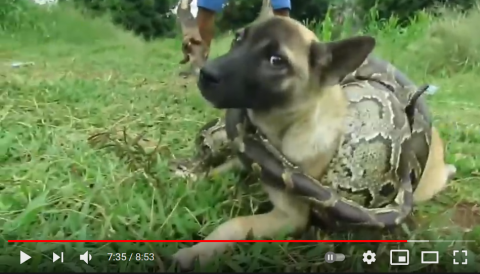
International Animal Rescue is part of a coalition of respected animal welfare organisations calling for an end to the showing and sharing of animal cruelty content on social media. Social media giants like YouTube, Facebook and TikTok facilitate the sharing, promotion and monetisation of cruelty content, resulting in astronomical numbers of likes, follows and views for animal suffering and abuse ranging from the subtle to the extreme.
The Social Media Animal Cruelty Coalition (SMACC) is a collaboration by various members of the Asia for Animals Coalition network (AfA.)
The Asia for Animals Social Media Animal Cruelty Coalition (SMACC) has today released a report - Making Money from Misery: How social media giants profit from animal abuse - which reveals the scope of the cruelty content problem on today’s largest social media platforms. Animals have become voiceless victims of the scramble for clicks and advertising dollars, as videos promoting, encouraging and profiting from their abuse run rampant.
You can view the report here: https://www.asiaforanimals.com/smacc-report
Between July 2020 and August 2021, SMACC documented 5480 individual links to videos containing animal cruelty content on YouTube, Facebook and TikTok. Analysis of the data revealed that producers of these videos can become almost ‘celebrity-like’ with some channels boasting millions of followers. SMACC found that the total number of views of these videos alone was in the region of 5.3 billion, highlighting the scale of this unaddressed and little known issue.
Cruelty content takes many forms, from the subtle and probably unintentional, to the very obvious and clearly intentional. The vast majority of content that SMACC documented appears to fall into the latter category. There is footage of people eating live animals; there are films of infant monkeys being buried alive. Kittens are stepped on or set alight. Cruelty content is posted in order to gain recognition in the form of likes, comments, or shares, or for financial remuneration. SMACC member Lady Freethinker estimated that in videos logged over three months in 2020, YouTube earned up to $12 million from the sharing of animal cruelty content, with the content creators themselves earning nearly $15 million. Clearly, animals are suffering for the sake of entertainment and profit.
To date, organisations trying to tackle this problem have met with very little success; even securing a dialogue with the platforms that continue to facilitate the availability of cruelty content has been difficult. SMACC is urging YouTube, Facebook, TikTok, and other social media platforms where cruelty content is shared to work with experts to clearly define animal cruelty, to create and enforce policies that do not allow the sharing of cruelty content, and to develop robust monitoring systems to identify and remove such content without reliance on viewer reporting.
Sign our petition and tell these social media giants enough is enough!
Alan Knight OBE, Chief Executive of International Animal Rescue, said: “It is inexcusable for social media companies such as YouTube, Facebook and TikTok to turn a blind eye to the sickening scenes of animal abuse being posted on their platforms. It is their moral responsibility to crack down on content showing animals forced to suffer for the sake of entertainment and financial gain. There’s no doubt that these media corporations have the power to remove these vile videos and it’s reprehensible that they haven’t done so already. They feed the basest instincts of a depraved minority and must be denied a platform and an audience in order to stamp them out.”
“As a veterinarian, I am shocked by the acts of cruelty and abuse inflicted on non-human primates and other non-human animals that is being filmed for broadcast on social media platforms such as YouTube, Facebook and TikTok. Deliberately and gratuitously causing pain, fear and distress to these animals is morally reprehensible. No video-sharing platform should tolerate animal cruelty for any reason. By permitting such content on their platforms, these companies are not only promoting animal cruelty and abuse, they are effectively encouraging its continuation by not blocking perpetrators and reporting them to the relevant authorities for investigation.”
Dr Nedim Buyukmihci, Emeritus Professor of Veterinary Medicine and representative of Action for Primates
“Cruelty content is hurtling out of control as social media platforms allow such egregious abuse of animals to be normalised in the eyes of the general public. Platforms such as Facebook, YouTube and Tik Tok have a moral responsibility of care to promote kindness content and end suffering in whatever form it takes.”
Jill Robinson MBE, Dr med vet hc, Hon LLD, Founder and CEO of Animals Asia Foundation.
“The devastating data revealed by this research only scratches the surface in exposing the shocking extent of animal cruelty being promoted on social media. Now more than ever, it is time for social media platforms such as YouTube, Tik Tok, and Facebook to stop profiting from animal suffering and instead take action to end this devastating cruelty for clicks being broadcast on their platforms. As proud members of the Asia for Animals coalition, HSI is very pleased to see leading animal groups from across the globe coming together to address this deeply disturbing but largely overlooked animal abuse issue and we hope to see platforms making meaningful pledges to swiftly shut down this abusive activity”.
Adam Parascandola, Vice President of Global Animal Rescue and Response at Humane Society International
“Online animal cruelty shows humanity at its worst, normalizes a view that wild animals can be pets, and enables the illegal trade in many species, including Africa’s endangered apes and monkeys. So PASA is proud to join with Asia for Animals and the many other organizations that contributed to this report to fight this scourge. Together, we will hold tech companies accountable for enabling this unconscionable cruelty and create new opportunities to protect wildlife across the globe.”
Gregg Tully, Executive Director, Pan African Sanctuary Alliance (PASA)

